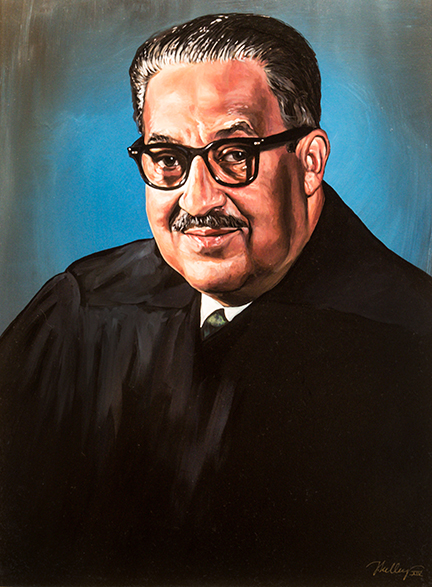
Thurgood Marshall
U.S. Supreme Court Justice
Thurgood Marshall: Supreme Court Justice (1908-1993)
Early Life and Education
- Born July 2, 1908 in Baltimore, Maryland
- Son of a railroad porter and schoolteacher
- Graduated first in class from Howard University Law School (1933)
- Mentored by civil rights lawyer Charles Hamilton Houston
Landmark Legal Career
- Won first major civil rights case (Murray v. Pearson) 1936
- Served as NAACP Chief Counsel (1938-1961)
- Argued 32 cases before Supreme Court, won 29
- Notable victories:
- Smith v. Allwright (1944) - outlawed white primaries
- Shelley v. Kraemer (1948) - banned restrictive covenants
- Brown v. Board of Education (1954) - ended school segregation
Judicial Appointments
- Appointed to Second Circuit Court of Appeals (1961)
- Became first Black U.S. Solicitor General (1965-1967)
- Nominated to Supreme Court by LBJ (1967)
- Confirmed 69-11 by Senate
- Served until retirement in 1991
Supreme Court Legacy
- Authored 322 majority opinions
- Key dissents in:
- San Antonio Independent School District v. Rodriguez (1973)
- Regents of the University of California v. Bakke (1978)
- Championed:
- Individual rights
- Equal protection
- Criminal justice reform
- Mentored future justices including Ruth Bader Ginsburg
Later Life and Honors
- Retired due to failing health (1991)
- Awarded Presidential Medal of Freedom (1993)
- Died January 24, 1993 in Bethesda, Maryland
- Memorialized by:
- Thurgood Marshall Federal Judiciary Building
- Baltimore-Washington International Airport renamed in his honor
- $50,000 legal scholarship in his name
Key Statistics
| Achievement | Year/Data |
|---|---|
| Supreme Court tenure | 1967-1991 (24 years) |
| Cases argued before SCOTUS | 32 |
| Majority opinions written | 322 |
| Law school class rank | 1/6 |
“In recognizing the humanity of our fellow beings, we pay ourselves the highest tribute.” - Thurgood Marshall